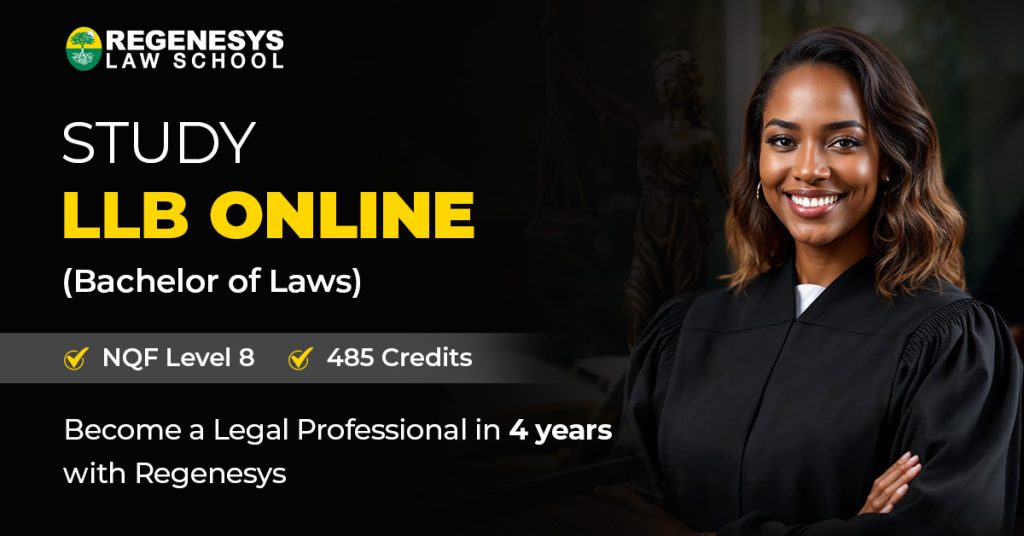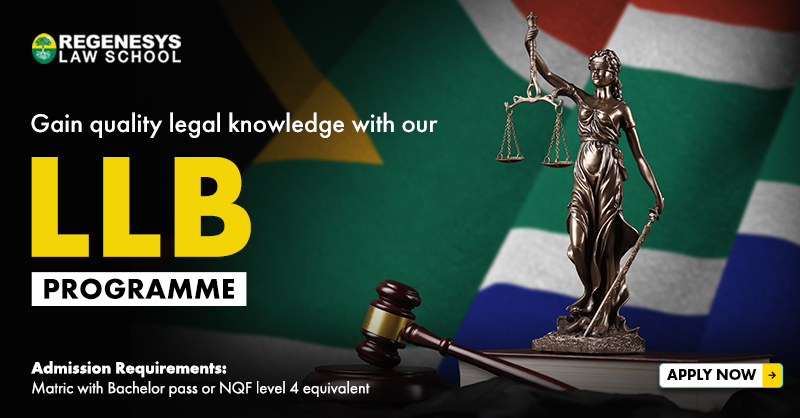to courtrooms. For aspiring legal minds, understanding the difference between LLB and paralegal qualifications is important when it comes to making the right decision. Both qualifications serve different purposes but contribute significantly to the administration of justice and legal service delivery. The decision between pursuing an LLB or a Paralegal qualification involves evaluating your career goals, academic readiness, time investment, and long-term aspirations.
In this article, we will cover the LLB vs Paralegal debate, explore career opportunities, outline salary expectations, and show why Regenesys Law School is the preferred destination for South African legal education.
Table of Contents

What Is an LLB?
The Bachelor of Laws or LLB is a professional undergraduate degree that forms the foundation for practising law in South Africa. It is the most direct academic route to becoming an attorney or advocate and enables graduates to contribute meaningfully to the legal system. Recognised by the Council on Higher Education (CHE), the LLB is a gateway to courtroom practice, legal advisory roles, and postgraduate specialisation.
At Regenesys Law School, the LLB programme is built around legal theory, applied knowledge, and ethical practice. The curriculum is tailored to produce legal professionals who are prepared to tackle the complexities of modern law.
Core features of the LLB at Regenesys
- Duration: 4 years
- NQF Level: Level 8
- Study Format: Contact and online
- LLB Requirements:
- Matric with Bachelor pass or NQF level 4 equivalent qualification
- English 1st – 50% | English 2nd – 60%
- A levels for International students (Africa)
- Higher level pass for international students 26 APS
- Competent in Mathematics, English, written and oral communication skills at NQF Level 4
- Basic computer skills, internet connection and relevant IT resources
The Bachelor of Laws subjects also offer critical grounding in jurisprudence, ethics, and statutory interpretation, building analytical reasoning for real-world legal problems. This programme is ideal for those asking, “How to Become a Lawyer in South Africa?” as it forms the essential academic step.
Read more on What Subjects Are Needed to Become a Lawyer? here!
What Is a Paralegal Qualification?
A Paralegal Qualification is a qualification designed for those who wish to support the legal process without becoming practising lawyers. Paralegals work in law firms, courts, government offices, and NGOs, offering essential services like drafting legal documents, conducting legal research, and managing case files.
The paralegal vs law degree comparison lies in scope, while paralegals do not represent clients in court, but their administrative and legal support functions are indispensable.
At Regenesys, the Paralegal Qualification is designed to be practical and responsive to workplace needs. It helps students gain entry into the legal field quickly and is ideal for those who may consider pursuing an LLB later.
1. Paralegal Programme Highlights
- Duration: 2 years
- NQF Level: 5
- Study Format: Online
- Paralegal Qualification Requirements:
- NQF level 4 Qualification (OR)
- 3 years of experience within the legal sector
This qualification is highly relevant to those seeking legal qualifications in South Africa, offering a shorter duration and immediate employment potential.
Read more on Exploring Paralegal Qualifications: A Guide for Aspiring Legal Professionals
Key Differences between LLB and Paralegal Qualification
When we discuss LLB vs Paralegal Qualification, the differences are substantial in terms of academic depth, career progression, and professional authority. An LLB is a requirement for becoming a practising lawyer, while a paralegal qualification prepares graduates for support roles in legal environments.
The table below helps to highlight the differences between these two legal qualifications in South Africa :
|
Feature |
LLB Degree |
Paralegal Qualification |
|
Academic Level | ||
|
Duration |
4 years |
2 years |
|
Entry Requirement |
Matric with Bachelor Pass or NQF Level 4 equivalent |
NQF Level 4 equivalent Qualification |
|
Career Outcome |
Attorney, Advocate, Legal Advisor |
Legal Assistant, Court Clerk |
|
Work Scope |
Legal Practice and Courtroom Work |
Legal Support and Administration |
|
Further Exams |
Required |
Not Applicable |
|
Further Study |
Master’s, Doctorate, MBA |
Pathway to LLB is possible |
Understanding this LLB vs Paralegal distinction helps students map their educational journeys based on interest, time, and long-term vision.
Read more on Paralegal vs Lawyer: Know the key differences and similarities

Career Opportunities and Salary Prospects
The South African legal sector offers a wide spectrum of career paths depending on the qualification you choose. Whether you hold an LLB or a paralegal qualification, there are job roles tailored to your level of expertise and experience.
When high school students or recent graduates are exploring their options, they must also consider what comes after LLB and Paralegal Qualification and the expected salaries for various positions. This allows aspirants to build a realistic outlook of the career opportunities and earning potential available to them after graduation.
1. LLB Careers in South Africa
- Assistant Prosecution Officer
- Law Professor
- Legal Adviser
- Legal Researcher
2. Paralegal Careers
- Paralegal
According to World Salaries, lawyers in South Africa make an average of R725,700 annually, as of June 2025. This comes out to an average LLB law salary per month of R60,475.
Entry-level lawyers typically earn R357,300, while experienced lawyers can earn more than R1,000,000 annually.
According to Talent.com, the average annual salary of a Paralegal in South Africa is R180,000 as of June 2025. Entry-level paralegals typically earn R132,000, while experienced professionals can earn annual compensation above R200,000.
When discussing LLB vs Paralegal Qualification, one similarity is that the salaries graduates demand can vary depending on several factors. Experience, specialisation, size of the firm, and geographic location can affect salaries. However, an LLB offers greater long-term earning potential due to professional licensing and courtroom practice.
LLB vs Paralegal: Which Is Right for You?
The LLB vs Paralegal decision depends on several personal and academic factors. Some may view the paralegal qualification as a practical first step into the legal profession, while others are ready to commit to the full LLB journey.
One of the main differences lies in eligibility. An LLB requires a Matric with a Bachelor’s pass. This makes it suitable for those who have already excelled academically in high school and are ready for a long-term academic commitment.
By contrast, a Paralegal qualification is more accessible. Applicants can qualify with a matric pass or relevant work experience, making it a valuable option for those seeking an alternative route to higher education.
Consider the following when making your choice between these legal qualifications in South Africa:
- Career Goals: Do you want to be a practising attorney or support legal functions?
- Study Time: Are you prepared for a 4-year academic commitment?
- Cost and Accessibility: Do you need a quicker entry into the workforce?
- Academic Readiness: Do you meet the entry requirements for an LLB, or is a paralegal qualification a more achievable starting point?
- Future Ambitions: Would you like to pursue an MBA or Master of Laws (LLM)?
A paralegal qualification provides valuable exposure and practical skills. It can also serve as a stepping stone to the LLB, offering learners the opportunity to enter the legal sector while gradually building their academic credentials.
Why Regenesys is the Right Choice?
Choosing the right institution is just as important as choosing the qualification. Regenesys Law School delivers both the LLB and Paralegal Qualification with academic rigour, workplace relevance, and real-world applicability. As a proudly South African institution, Regenesys provides a supportive and future-ready environment for aspiring legal professionals.
1. Why Regenesys stands out
- Accredited legal qualifications recognised across South Africa
- Access to experienced legal academics and practitioners
- Flexible study formats
- Career-aligned pathways
Regenesys enables you to start your journey with a paralegal qualification and seamlessly transition into an LLB if you choose to advance. With structured guidance and academic support, Regenesys is a long-term career partner.
Conclusion
The LLB vs Paralegal choice is more than a matter of duration or cost, it also reflects your professional goals and commitment to the legal sector. If your dream is to represent clients, argue in court, or advise on corporate legal strategy, then an LLB is the way forward. If you seek a quicker path to employment and are passionate about supporting legal processes, a paralegal qualification may suit you best.
Whichever route you take, Regenesys offers an academically sound, future-ready platform. With options to study online or on campus, your legal education can start on your terms.
Visit the Regenesys Law School website today to learn more about our offerings and enrol for the qualification that best suits your needs.

LLB vs Paralegal Qualification – FAQs
Can a paralegal become a lawyer in South Africa?
Yes, it is possible if they complete the LLB programme after gaining their Paralegal Qualification.
What is the difference between LLB and Paralegal?
An LLB qualifies you to practise law, while a paralegal supports lawyers in legal tasks.
How many years to study LLB?
At Regenesys Law School the LLB programme is designed to be completed in 4 years with full-time study
Is a Paralegal qualification recognised in South Africa?
Yes, the Regenesys qualification is accredited by CHE and registered with SAQA, making it valued amongst employers.
What subjects are included in an LLB?
Some Bachelor of Laws subjects at Regenesys include Criminal Law, Constitutional Law, Ethics, Law of Succession, and more.
Can I study law part-time or online at Regenesys?
Yes, Regenesys offers flexible learning options for working professionals.







